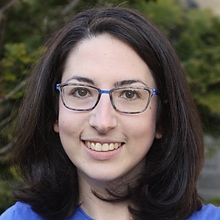Rudinger Brings Expertise in Natural Language Understanding to CLIP Lab

A new University of Maryland faculty member brings expertise in natural language understanding to her role as a researcher and educator in the Computational Linguistics and Information Processing (CLIP) Lab.
Rachel Rudinger, who starts this fall as an assistant professor in the Department of Computer Science, says she’s excited to be joining the CLIP lab.
Rudinger lists the attributes that attracted her to UMD: its “unusually strong” support of research in language and computation; world-class departments in computer science and linguistics; an outstanding natural language processing (NLP) research group; and the technical and administrative support provided by multidisciplinary units like the University of Maryland Institute for Advanced Computer Studies (UMIACS) and the Language Science Center.
Rudinger, who has an appointment in UMIACS, received her doctorate in computer science from the Johns Hopkins University Center for Language and Speech Processing in 2019. She joins UMD after completing a one-year postdoctoral fellowship at the Allen Institute for Artificial Intelligence (AI2) in Seattle, joint with the University of Washington. The position was through AI2’s Young Investigator postdoctoral program.
Her research focuses on problems in natural language understanding, including knowledge acquisition from text, commonsense inference, computationally-tractable semantic representations, and semantic parsing.
“My research makes use of large-scale computing infrastructure of the kind that UMIACS is uniquely well-equipped to support, so I am very fortunate to be a part of the institute,” Rudinger says.
Naomi Feldman, an associate professor of linguistics and director of the CLIP Lab, says she is “delighted” to have Rudinger join the lab.
“Rachel is an expert in natural language understanding and computational semantics, which has many points of connection to other research that's going on in CLIP,” she says. “Having her at Maryland could also be a game-changer in terms of creating tighter connections between computer science and the language science community across campus.”
In collaboration with researchers at AI2, Rudinger is currently leading a project focused on enabling a type of granular reasoning—a form of decision reasoning—in natural language understanding systems.
“Consider the sentence ‘Pat dropped his glass and Chris went to retrieve the broom,’” Rudinger says. “Most humans reading this sentence will likely infer an important detail about the situation that is not stated explicitly. Namely, that the glass has fallen to the floor and shattered. The ability to fill in these ‘gaps’ in discourse is a crucial component of natural language understanding, and yet it is an ability that still eludes modern NLP systems because they lack common-sense knowledge or reasoning abilities.”
To tackle this problem, Rudinger says, AI and NLP researchers have developed resources with schematized representations of world knowledge or inference patterns. Such a resource might, for instance, encode an inference like “If X is dropped, then likely X breaks.”
A limitation of these knowledge-encoding resources, however, is that they often do not enable fine-grained distinctions between the contexts in which an inference rule is more or less likely to apply—a dropped object is, for instance, less likely to break if it is made of rubber or falls on a soft carpet. She says this lack of granularity has in the past been a contributing factor to the brittleness of reasoning systems that use these knowledge resources and they are hoping to improve upon them.
Rudinger is also collaborating with a team of researchers at Johns Hopkins University and the University of Rochester on a project to develop methods of inferring the underlying structure of events described explicitly or implicitly in news articles. The project is funded by the Defense Advanced Research Projects Agency’s (DARPA) program on Knowledge-directed Artificial Intelligence Reasoning Over Schemas (KAIROS).
Rudinger is looking forward to getting involved in new projects in the CLIP Lab.
“Many research problems in NLP can be viewed as different sides of the same coin, so I am looking forward to forging new lines of research in collaboration with other CLIP faculty and students,” she says.
—Story by Melissa Brachfeld
